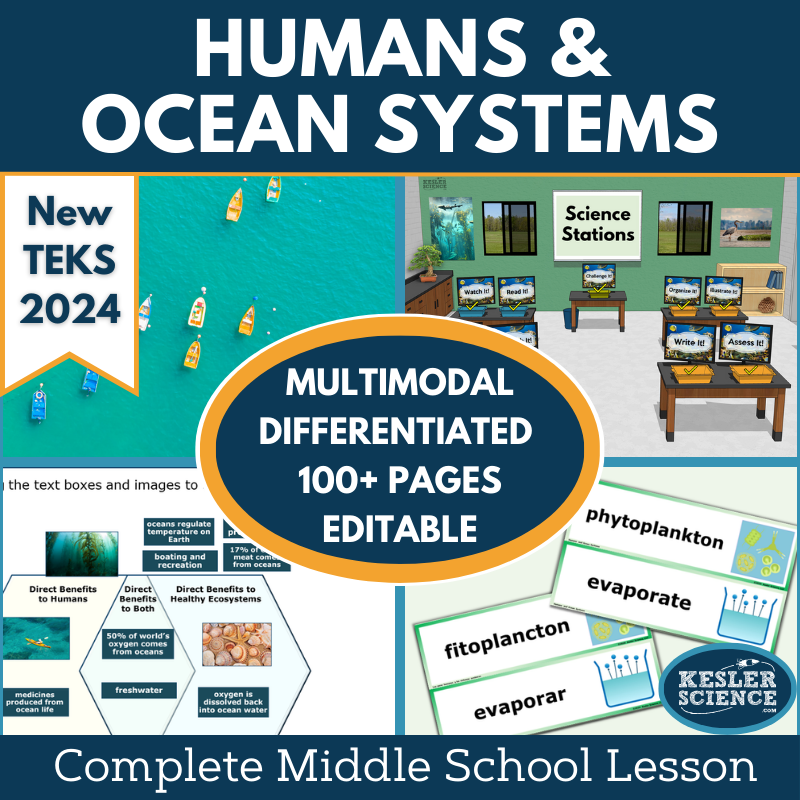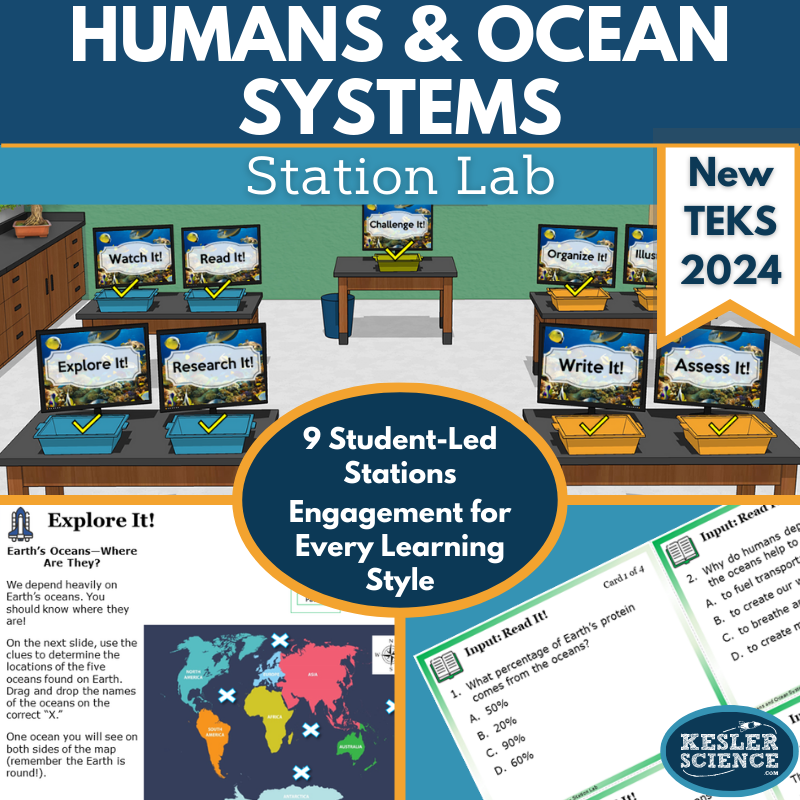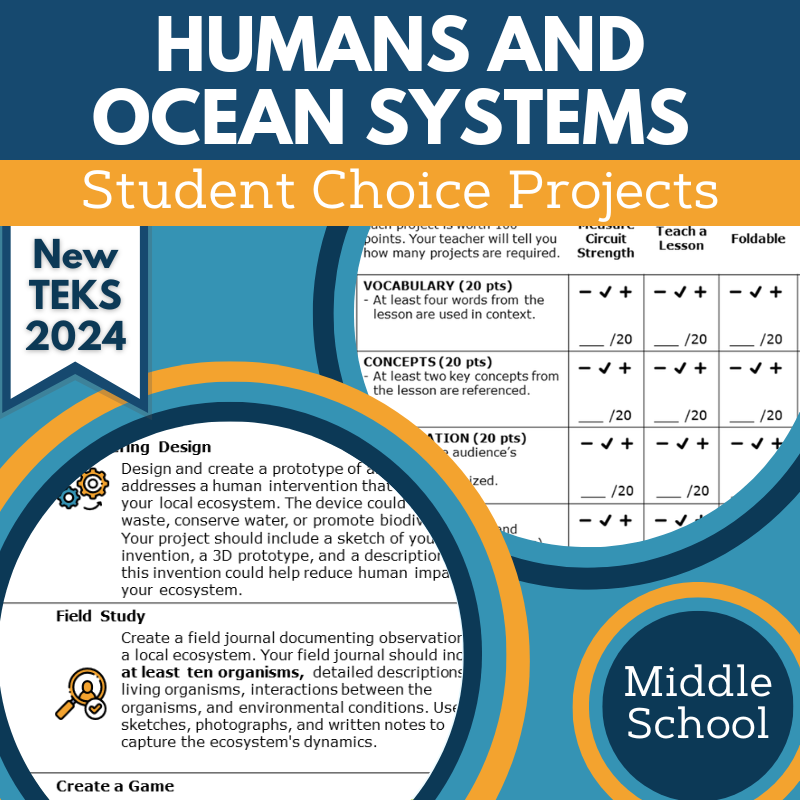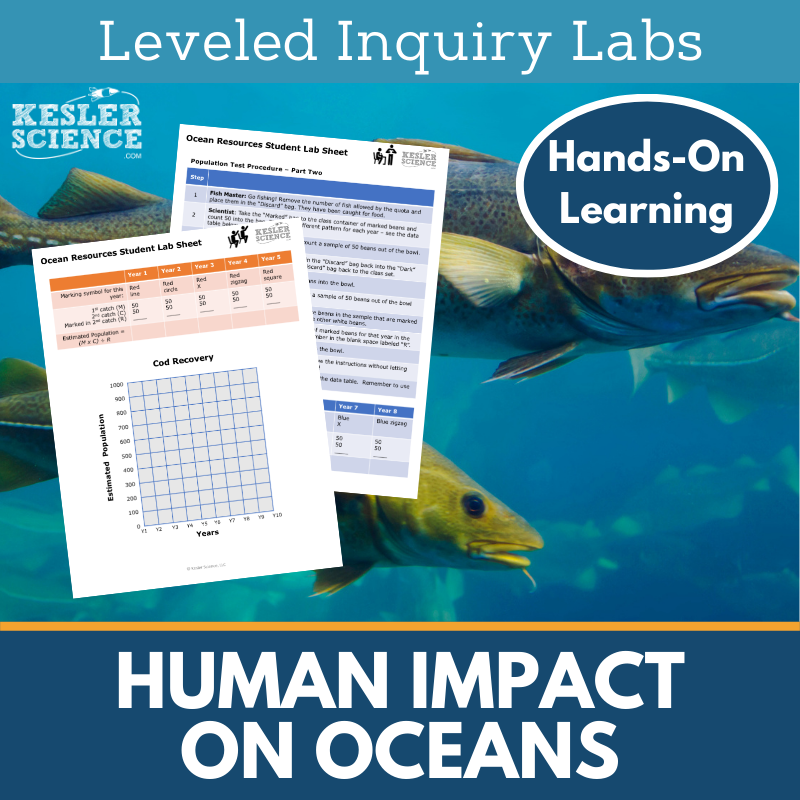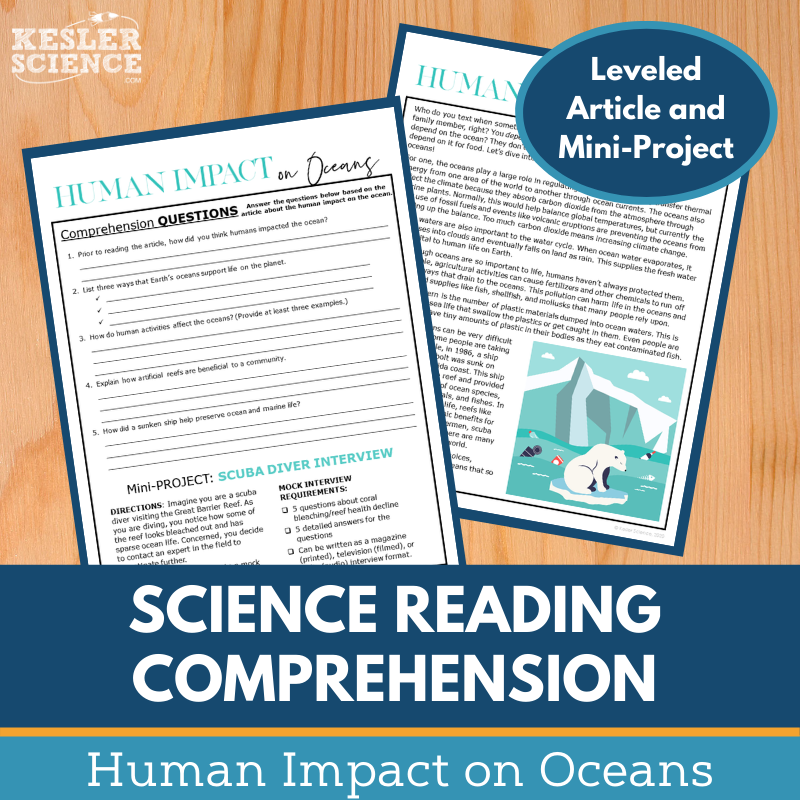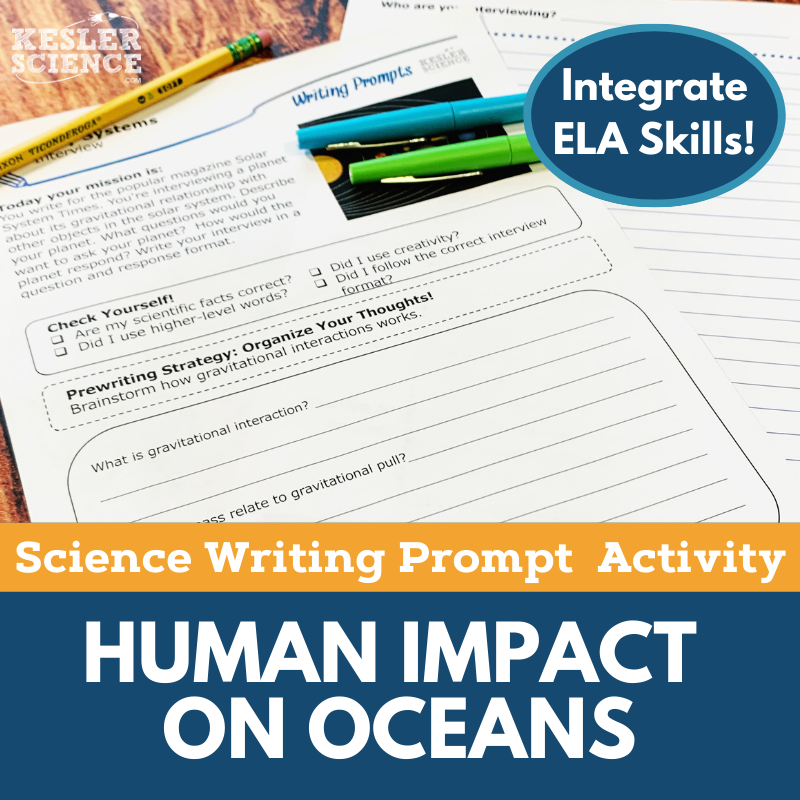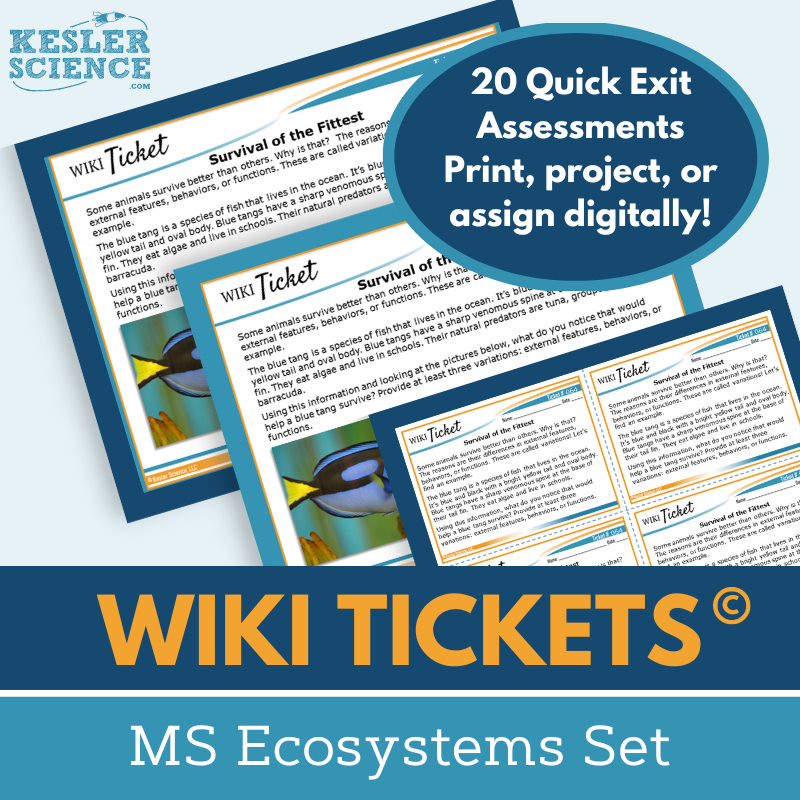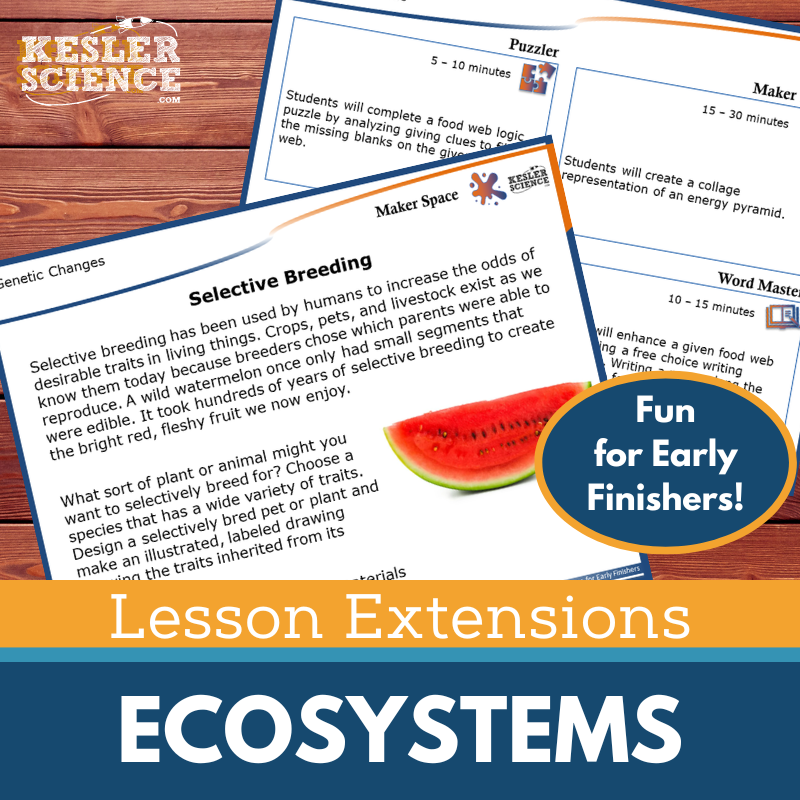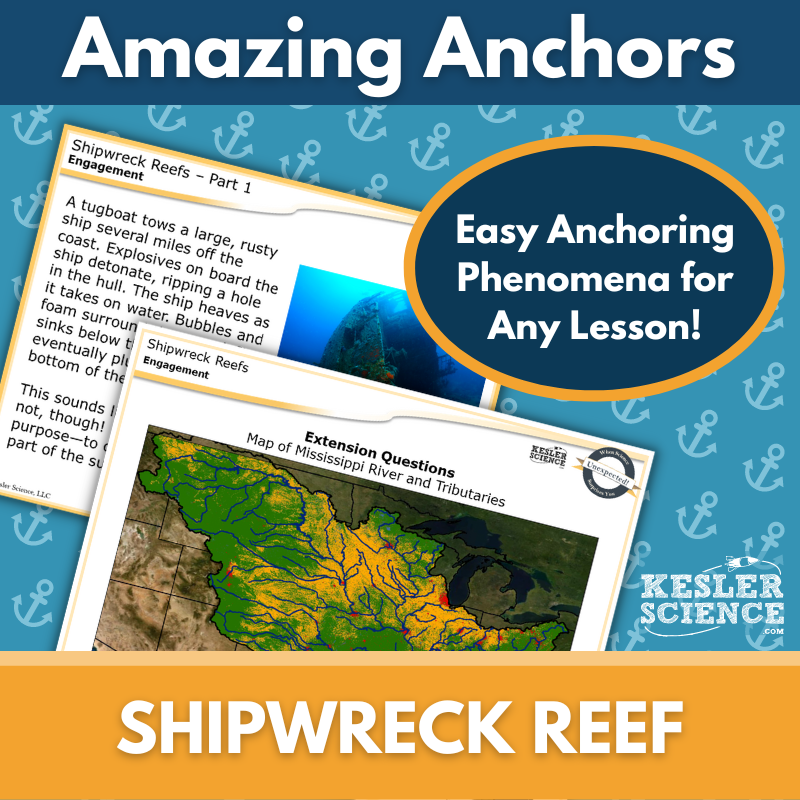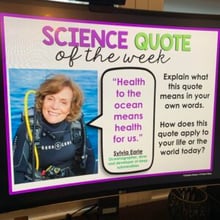Humans & Ocean Systems Activities for Middle School Science
Aligned with TEKS 7.11B, this 5E lesson on human dependence and influence on ocean systems engages students with minimal-prep, student-led activities in digital and print formats, including Spanish translations. The resources below will give students a comprehensive understanding of humans and ocean systems. All of the following materials are also included in the Kesler Science Membership.
The Kesler Science Humans & Ocean Systems 5E Lesson is a comprehensive unit on human dependence and influence on ocean systems, aligned with TEKS 7.11B. It includes editable presentations, worksheets, choice projects, assessments, and differentiated, student-led activities requiring minimal prep. Multimodal learning keeps students engaged, with flexible digital and print formats, Spanish translations, and editable PowerPoints.
The lesson follows the 5E Model, beginning with engaging discussions and vocabulary in English and Spanish. Students explore through a differentiated station lab featuring hands-on experiments, reading passages, research activities, videos, and categorization tasks. Output stations allow students to illustrate, write, and assess their understanding, with a bonus challenge station for deeper learning.
Explanation resources include editable PowerPoints and interactive notebooks in English and Spanish. Elaboration activities offer student-choice projects on ocean systems, while evaluation features STAAR 2.0-aligned assessments, review questions, and worksheets for practice. The lesson is designed for both in-class and virtual learning, ensuring accessibility and engagement.
The Kesler Science Humans & Ocean Systems 5E Lesson is a comprehensive unit on human dependence and influence on ocean systems, aligned with TEKS 7.11B. It includes editable presentations, worksheets, choice projects, assessments, and differentiated, student-led activities requiring minimal prep. Multimodal learning keeps students engaged, with flexible digital and print formats, Spanish translations, and editable PowerPoints.
The lesson follows the 5E Model, beginning with engaging discussions and vocabulary in English and Spanish. Students explore through a differentiated station lab featuring hands-on experiments, reading passages, research activities, videos, and categorization tasks. Output stations allow students to illustrate, write, and assess their understanding, with a bonus challenge station for deeper learning.
Explanation resources include editable PowerPoints and interactive notebooks in English and Spanish. Elaboration activities offer student-choice projects on ocean systems, while evaluation features STAAR 2.0-aligned assessments, review questions, and worksheets for practice. The lesson is designed for both in-class and virtual learning, ensuring accessibility and engagement.
Engage your middle school students with this student-led station lab aligned to TEKS 7.11B, focusing on human dependence and impact on ocean systems. Designed for in-class or virtual learning, this life science activity encourages students to explore and explain human influence on ocean systems through nine interactive stations.
Students encounter new concepts through multimodal INPUT stations, including hands-on activities, video analysis, reading passages in English and Spanish, and research tasks. OUTPUT stations allow them to demonstrate understanding by organizing information, illustrating models, writing responses, and completing assessments. A bonus challenge station provides extension activities for advanced learners. This modular, low-prep resource promotes active engagement and critical thinking.
Engage your middle school students with this student-led station lab aligned to TEKS 7.11B, focusing on human dependence and impact on ocean systems. Designed for in-class or virtual learning, this life science activity encourages students to explore and explain human influence on ocean systems through nine interactive stations.
Students encounter new concepts through multimodal INPUT stations, including hands-on activities, video analysis, reading passages in English and Spanish, and research tasks. OUTPUT stations allow them to demonstrate understanding by organizing information, illustrating models, writing responses, and completing assessments. A bonus challenge station provides extension activities for advanced learners. This modular, low-prep resource promotes active engagement and critical thinking.
The Humans & Ocean Systems Student Choice Projects align with the 2021 TEKS standard 7.11B, allowing middle school students to choose a project that suits their preferred output style. A project page outlines six student-led options plus a “design your own” project, all with an editable rubric for teacher, peer, or self-assessment.
These flexible, multimodal projects offer creative ways for students to demonstrate their understanding. Teachers can adjust the rubric to fit grading needs. Two versions of the project page support differentiation, with modified options for students needing remediation and challenge options for advanced learners.
The projects require standard classroom supplies such as paper, markers, and scissors, and many options can be completed digitally.
The Humans & Ocean Systems Student Choice Projects align with the 2021 TEKS standard 7.11B, allowing middle school students to choose a project that suits their preferred output style. A project page outlines six student-led options plus a “design your own” project, all with an editable rubric for teacher, peer, or self-assessment.
These flexible, multimodal projects offer creative ways for students to demonstrate their understanding. Teachers can adjust the rubric to fit grading needs. Two versions of the project page support differentiation, with modified options for students needing remediation and challenge options for advanced learners.
The projects require standard classroom supplies such as paper, markers, and scissors, and many options can be completed digitally.
The Human Impact on Oceans Inquiry Lab aligns with TEKS, helping students understand human dependence on ocean systems and how activities like overfishing impact ecosystems. Students will model the effects of fishing quotas on a recovering population and estimate a cod population using beans if time allows.
This resource includes three differentiated lab versions to support diverse learners. The Dependent Student Lab provides structured guidance with procedural instructions and inquiry questions. The Modified Student Lab offers a highly structured experience with simplified questions and sentence stems. The Independent Student Lab allows advanced learners to take control of the lab process with minimal guidance.
Teacher resource pages include standards, objectives, materials, and preparation details. Editable reflection questions guide students through Claim, Evidence, and Reasoning (CER) statements. Answer keys and additional teacher support simplify planning and grading.
Using simple materials like cod cards, beans, bowls, measuring cups, and markers, this hands-on lab engages students in real-world ecological concepts.
The Human Impact on Oceans Inquiry Lab aligns with TEKS, helping students understand human dependence on ocean systems and how activities like overfishing impact ecosystems. Students will model the effects of fishing quotas on a recovering population and estimate a cod population using beans if time allows.
This resource includes three differentiated lab versions to support diverse learners. The Dependent Student Lab provides structured guidance with procedural instructions and inquiry questions. The Modified Student Lab offers a highly structured experience with simplified questions and sentence stems. The Independent Student Lab allows advanced learners to take control of the lab process with minimal guidance.
Teacher resource pages include standards, objectives, materials, and preparation details. Editable reflection questions guide students through Claim, Evidence, and Reasoning (CER) statements. Answer keys and additional teacher support simplify planning and grading.
Using simple materials like cod cards, beans, bowls, measuring cups, and markers, this hands-on lab engages students in real-world ecological concepts.
This Human Impact on Oceans Science Reading Comprehension Lesson explores how human activities like runoff, artificial reefs, and resource use have altered ocean systems. Students read a nonfiction article on human dependence on ocean systems, answer comprehension questions, and create a mock interview with a dive master or ocean life expert about changes in the Great Barrier Reef.
Designed for grades 6-8 (and advanced 5th graders), the resource includes a leveled science passage (Lexile 1100-1300), five to seven comprehension questions, and an interactive mini-project. A Cornell notes template is provided for student use. The visually engaging materials are printable in grayscale and compatible with digital learning platforms such as Google Classroom, MS Teams, Schoology, and Canvas.
Ideal for sub plans, ISS, extra credit, or whole-class instruction, this lesson builds science literacy and reading comprehension while fostering critical thinking and classroom discussions.
This Human Impact on Oceans Science Reading Comprehension Lesson explores how human activities like runoff, artificial reefs, and resource use have altered ocean systems. Students read a nonfiction article on human dependence on ocean systems, answer comprehension questions, and create a mock interview with a dive master or ocean life expert about changes in the Great Barrier Reef.
Designed for grades 6-8 (and advanced 5th graders), the resource includes a leveled science passage (Lexile 1100-1300), five to seven comprehension questions, and an interactive mini-project. A Cornell notes template is provided for student use. The visually engaging materials are printable in grayscale and compatible with digital learning platforms such as Google Classroom, MS Teams, Schoology, and Canvas.
Ideal for sub plans, ISS, extra credit, or whole-class instruction, this lesson builds science literacy and reading comprehension while fostering critical thinking and classroom discussions.
The Human Impact on Oceans Science Writing Prompt Activity engages middle school students in an invention-based design challenge to reinforce their understanding of human dependence on ocean systems. Aligned with TEKS, this activity encourages students to explore how human activities, such as runoff, artificial reefs, and resource use, have modified ocean systems. It fosters science reasoning, creativity, and writing skills while supporting both in-person and virtual learning.
This resource includes teacher directions with answer guides, project ideas, and rubrics, along with projection and print handouts in both full-sized and half-sheet formats. A digital PowerPoint version, compatible with Google Slides, allows for seamless integration into virtual classrooms. The writing prompt works well for cross-curricular activities, pre-test assessments, student choice projects, elaboration for early finishers, extra credit, make-up work, TELPAS samples, or differentiation exercises. These activities can be displayed on bulletin boards or compiled into student anthologies. Designed for review, this prompt assumes students have prior knowledge or access to research materials.
The Human Impact on Oceans Science Writing Prompt Activity engages middle school students in an invention-based design challenge to reinforce their understanding of human dependence on ocean systems. Aligned with TEKS, this activity encourages students to explore how human activities, such as runoff, artificial reefs, and resource use, have modified ocean systems. It fosters science reasoning, creativity, and writing skills while supporting both in-person and virtual learning.
This resource includes teacher directions with answer guides, project ideas, and rubrics, along with projection and print handouts in both full-sized and half-sheet formats. A digital PowerPoint version, compatible with Google Slides, allows for seamless integration into virtual classrooms. The writing prompt works well for cross-curricular activities, pre-test assessments, student choice projects, elaboration for early finishers, extra credit, make-up work, TELPAS samples, or differentiation exercises. These activities can be displayed on bulletin boards or compiled into student anthologies. Designed for review, this prompt assumes students have prior knowledge or access to research materials.
The WIKI Tickets© Formative Assessments provide engaging, flexible ways to check student understanding in 6th-8th grade science. This Ecosystems Set includes 20 topics, each with five format options: a full-screen projection version, three printable handouts, and a digital interactive version compatible with PowerPoint and Google Slides.
Aligned with NGSS and TEKS standards, these assessments cover key ecosystem concepts such as biodiversity, biotic and abiotic factors, competition for resources, ecological succession, energy flow, food webs, natural selection, and environmental impacts. Some topics have multiple assessments, ensuring comprehensive coverage. A table of contents file is included for easy alignment reference.
WIKI Tickets© can be used as exit tickets, bellringers, or quick checks in both in-person and virtual learning settings. Students can respond on paper, interact digitally, or complete assignments in a remote environment. These engaging, ready-to-use assessments help gauge student progress with ease.
The WIKI Tickets© Formative Assessments provide engaging, flexible ways to check student understanding in 6th-8th grade science. This Ecosystems Set includes 20 topics, each with five format options: a full-screen projection version, three printable handouts, and a digital interactive version compatible with PowerPoint and Google Slides.
Aligned with NGSS and TEKS standards, these assessments cover key ecosystem concepts such as biodiversity, biotic and abiotic factors, competition for resources, ecological succession, energy flow, food webs, natural selection, and environmental impacts. Some topics have multiple assessments, ensuring comprehensive coverage. A table of contents file is included for easy alignment reference.
WIKI Tickets© can be used as exit tickets, bellringers, or quick checks in both in-person and virtual learning settings. Students can respond on paper, interact digitally, or complete assignments in a remote environment. These engaging, ready-to-use assessments help gauge student progress with ease.
Lesson Extensions provide engaging, student-choice activities designed to challenge early finishers and deepen their understanding of ecosystems. These activities reinforce critical thinking, creativity, and problem-solving while keeping students engaged in rigorous yet enjoyable learning experiences. They are ideal for wrapping up lessons, filling downtime, and preventing distractions.
Each extension includes four interactive components: Puzzler for problem-solving, Maker Space for hands-on STEAM activities, Tech Connection for digital demonstrations, and Word Master for creative writing. With teacher directions, answer keys, and both print and projection versions, these extensions support independent learning and enrichment.
Covering topics such as biodiversity, biomes, ecological succession, food webs, human impact, photosynthesis, and resource availability, Lesson Extensions align with NGSS and TEKS standards, providing high-level, supplementary materials to push students further in their understanding of ecosystems.
Lesson Extensions provide engaging, student-choice activities designed to challenge early finishers and deepen their understanding of ecosystems. These activities reinforce critical thinking, creativity, and problem-solving while keeping students engaged in rigorous yet enjoyable learning experiences. They are ideal for wrapping up lessons, filling downtime, and preventing distractions.
Each extension includes four interactive components: Puzzler for problem-solving, Maker Space for hands-on STEAM activities, Tech Connection for digital demonstrations, and Word Master for creative writing. With teacher directions, answer keys, and both print and projection versions, these extensions support independent learning and enrichment.
Covering topics such as biodiversity, biomes, ecological succession, food webs, human impact, photosynthesis, and resource availability, Lesson Extensions align with NGSS and TEKS standards, providing high-level, supplementary materials to push students further in their understanding of ecosystems.
This Amazing Anchors Phenomenon Lesson engages students with ocean ecosystems through real-world connections. It begins with an introductory reading on artificial reefs, followed by comprehension and extension questions to prepare students for further learning. An explanatory reading then breaks down the science behind ocean ecosystems, reinforcing concepts with additional comprehension questions.
Aligned with TEKS, this no-prep resource includes teacher directions, answer keys, projection slides, and both print and digital formats for Google Classroom and other LMS platforms. A modified version provides sentence starters to support student comprehension. Designed to bookend a lesson, these engaging readings serve as supplements to reinforce learning in any in-person or virtual classroom.
This Amazing Anchors Phenomenon Lesson engages students with ocean ecosystems through real-world connections. It begins with an introductory reading on artificial reefs, followed by comprehension and extension questions to prepare students for further learning. An explanatory reading then breaks down the science behind ocean ecosystems, reinforcing concepts with additional comprehension questions.
Aligned with TEKS, this no-prep resource includes teacher directions, answer keys, projection slides, and both print and digital formats for Google Classroom and other LMS platforms. A modified version provides sentence starters to support student comprehension. Designed to bookend a lesson, these engaging readings serve as supplements to reinforce learning in any in-person or virtual classroom.
Year-Round Resources
These year-round activities will increase your students' understanding of many middle school science topics. All of these activities are also included in the Kesler Science Membership.
Visual Data & Graphing
You're not alone if your students struggle with understanding graphs, charts, and tables. It's a skill that takes an enormous amount of practice. This resource will help students build a strong foundation in analyzing data and creating their own data visualizations.
Bell Ringers and Warm-Ups
These middle school science bell ringers are an excellent way to engage your students as soon as they walk into your classroom. This comprehensive FULL YEAR resource includes everything you need to start off each science class with an interesting warm-up activity.
Review Board Games
Each game board has been carefully designed to keep students engaged. There are 10 different action spaces on each board and dozens of question cards. All of the actions are related to science concepts and keep the students motivated throughout the game.
Each game is ready to play. Simply print out the board and the cards and let the students enjoy reviewing nine different units.
Essential Questions and Standards
Below are the essential questions and standards associated with the lessons and activities included in the atoms unit. This topic is only one of more than 100 middle school science topics included in the Kesler Science Membership.
-
How do humans depend on oceans?
-
How does human activity impact oceans?
-
TEKS Science - 7.11B Humans & Ocean Systems
Kesler Science Membership
Imagine never having to search for another middle school science lesson again. The membership gives you access to ALL of the Kesler Science products in one place (Yes, including everything above).
Say goodbye to long hours of lesson prep.

